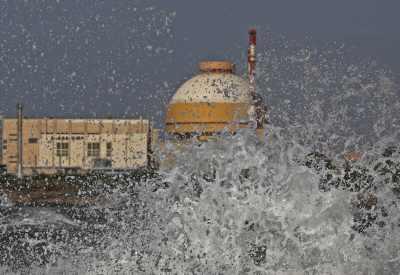 | « Back to article | Print this article |
 '...If the power situation does not improve in Tamil Nadu. The Congress will not allow the plant to start.'
'...If the power situation does not improve in Tamil Nadu. The Congress will not allow the plant to start.'
As the Supreme Court clears the decks for commissioning the controversial Koodankulam nuclear plant, A Ganesh Nadar checks the mood in the villages, the epi-centre of the protests.
The Koodankulam Nuclear Power Plant has been plagued by problems and protests for more than two years now.
Environmentalists moved the Supreme Court against the project, but last Monday, May 6, the apex court gave the project its approval.
Safety and security need to be taken care of, the Supreme Court said, but the project would benefit the public.
Along with the project, those protesting against it also received a breather. The court said the many cases registered against the protestors should be withdrawn to facilitate peace in the area.
"The court had to support the plant," feels Koodankulam Panchayat President Sandal Muthuraj. "There are 22 nuclear plants in India. If the Supreme Court did not allow this plant it would mean the other plants are also dangerous and would have to be shut down."
Discussing the opposition to the nuclear plant, Muthuraj says, "In the beginning even I protested. My name appears on the list of accused in the first bus-stoning incident here. Later, I got bored with the protests."
"Outsiders hijacked the agitation," he adds, "and we (the villagers) were kept out of it. The central government announced Rs 500 crore (Rs 5 billion) for 13 villages on the coast; my village was one of them. I went to visit the collector and was labeled a traitor by the protestors."
Defending the central government, the panchayat president says it is building a hospital in the area. "The funds are controlled by the state government. There is a misconception that the money came to the panchayat, but we did not get a single rupee," he clarifies.
The protestors have accused Muthuraj of joining hands with the collector. "They are accusing me of making money from the scheme," he complains.
Koodankulam village has 13,000 residents and only about 15 per cent of the villagers support the Koodankulam Nuclear Power Plant. Why is that so, I asked Muthuraj.
"It started with an advertisement in the newspapers about safety measures," the panchayat president explains.
"It showed people running around with their noses covered. Then the area was evacuated without warning the locals as part of a safety drill. The siren was so loud it scared the villagers."
"This is what made them (the villagers) think the plant is dangerous. It wasn't even operating then," adds Muthuraj.
The villagers were worried that they would have to evacuate their homes even before the project commenced operations.
"You think the villagers understand nuclear energy or accidents? They don't," says Muthuraj. "The newspaper advertisements the nuclear plant issued scared them."
A local supporter of the Dravida Munnetra Kazhagam, speaking on condition that he would not be identified by name for this report, says, "We told our then allies -- the Congress -- not to start the plant till the assembly election was over."
"Tamil Nadu is facing severe power cuts. We lost the last election because (then Tamil Nadu chief minister M) Karunanidhi ordered five-hour power cuts. Now, the state only has five hours of power."
"(Current Tamil Nadu Chief Minister) J Jayalalithaa will not win a single Lok Sabha seat if the power situation does not improve," this DMK supporter warns, adding, "The Congress will not allow the plant to start."
So what has changed after the verdict?
Idinthakarai village -- the epicentre of the struggle against the KNPP -- has a check-post, which is manned by village youth.
S P Udaykumar, coordinator, People's Movement Against Nuclear Energy, and the leader of the protests, is sitting in the village church, where all important protest meetings are held, along with 20 fishermen.
"It was an incomplete judgment," he says, clearly unhappy with the Supreme Court verdict.
"They (the honourable justices) said nothing about the quality of components used in the plant. So many leaks, so many accidents and the court ignored all of that," he says.
Sub-standard material was used to build the project, alleges Udaykumar. "Six people have died of electric shocks as the cables were of poor quality," he claims.
"It has been three years since work on the project was completed. I doubt it will start," adds Udaykumar.
He is, however, pleased with the Supreme Court's decision to withdraw cases against the protestors. "It will bring peace to the people who have been to jail for silent protests, who have been shuttling between the courts and police stations for months on end," he says.
Shops facing the main gate of the nuclear plant in Koodankulam village are open. Before the Supreme Court order, the shutters would be down, more often than not.
On some days, the shopkeepers protested against the plant, on other days they were up in arms against the arrest of fellow protesters.
A tea stall near the plant is abuzz with conversation; local residents sip chai and discuss the consequences of the verdict.
"I am very happy with the Supreme Court's order as Tamil Nadu is facing a severe power crisis," says a villager, who is referred to as Mohammadbhai.
Another local, James, asks Mohammadbhai to "speak softly."
"If the protestors hear you, you will be beaten up and isolated from the village," James warns. "Remember what happened to the panchayat president, he could only move around with ten policemen."
"The days of beating up people are gone," says the tea stall owner. "The Supreme Court wants all cases against the protestors to be withdrawn. If they (the protestors) go around beating up or threatening people, it will go against them."
Image: The Koodankulam nuclear plant | Photograph: Adnan Abidi/Reuters